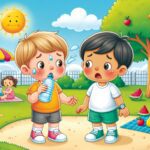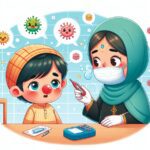Hydration tips for ill or feverish toddlers are essential for parents to understand, as they play a crucial role in the recovery process of their little ones. When toddlers are ill or have a fever, they are at a higher risk of dehydration, which can complicate their health further. This article aims to provide parents and caregivers with valuable information on keeping toddlers hydrated, the signs of dehydration to watch for, and when to seek medical attention.
Understanding the Importance of Hydration
Hydration is critical for everyone, especially for toddlers who are ill or feverish. The body uses fluids to regulate temperature, and when a toddler has a fever, they lose fluids more rapidly through sweating. Ensuring your toddler remains hydrated helps their body fight off the illness and recover faster. Additionally, proper hydration aids in the digestion of food and the absorption of nutrients, which can be particularly important when a child’s appetite might be reduced.
It’s also essential to recognize the signs of dehydration in toddlers, which can include dry mouth, fewer tears when crying, less frequent urination, or dark yellow urine. If you notice any of these signs, or if your child appears lethargic, it may be time to take action to increase their fluid intake or seek medical attention.
Hydration Tips for Ill or Feverish Toddlers
Offering fluids frequently is key when it comes to hydration tips for ill or feverish toddlers. Water is always a great choice, but at times, toddlers may refuse to drink it. In such cases, you can try offering oral rehydration solutions, which are designed to replace fluids and electrolytes. You can find these solutions at most pharmacies, or you can prepare a homemade version by mixing water, salt, and sugar, following guidelines from reputable health organizations.
Another tip is to offer fluids in a fun and appealing way. Use colorful cups or straws to make drinking more attractive. You can also offer ice pops made from diluted fruit juice or oral rehydration solutions. These can be particularly soothing if your toddler has a sore throat or is reluctant to drink because of nausea.
When to Seek Medical Attention
While many cases of fever and illness in toddlers can be managed at home with proper care and hydration, there are times when it is necessary to seek medical attention. If your toddler shows signs of severe dehydration, such as no tears when crying, unusually dry diapers, or a sunken appearance to the eyes or cheeks, medical intervention may be required. Similarly, if the fever persists for more than 24 hours in a child younger than 2 or for more than 72 hours in an older child, it’s important to consult a healthcare provider.
Furthermore, you should also seek immediate medical attention if your toddler experiences difficulty breathing, persistent vomiting, a rash that doesn’t fade when pressed, extreme irritability, or if they appear significantly lethargic. These could be signs of a more serious condition that requires prompt medical evaluation.
For more insights on managing your toddler’s health, consider exploring our library of articles, such as Navigating Your Baby’s First Cold: Symptoms and When to Call the Doctor, Recognizing Signs of Food Allergies in Infants, and Strategies for Safely Managing Fever in Children.
Keeping your toddler hydrated during illness or fever is crucial for their health and recovery. By following these hydration tips for ill or feverish toddlers and knowing when to seek medical attention, you can help ensure your child’s well-being during these challenging times.
For further reading on keeping your toddler safe and healthy, check out our articles on Creating a Non-Toxic Nursery: Safe Materials and Products, Safe Sleep Practices to Reduce the Risk of SIDS, and How to Ensure Water Safety for Young Children During Summer.













